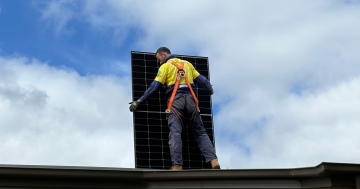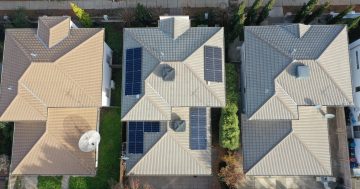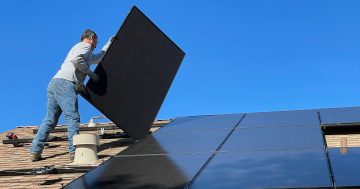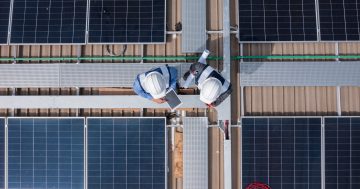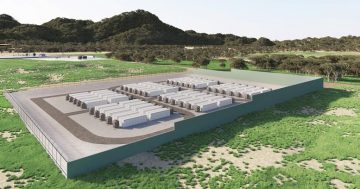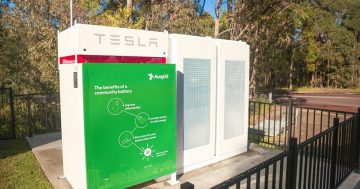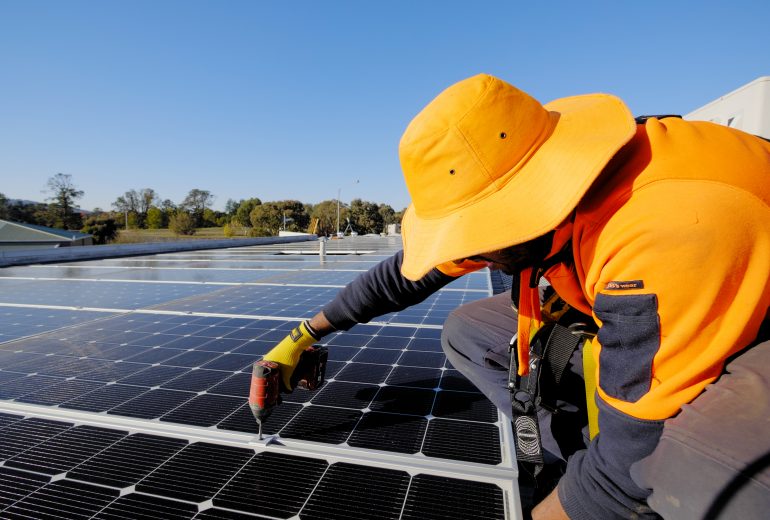
The rooftop solar industry and its customers have been waiting for the ACT Government’s Sustainable Household Scheme to commence. Photo: SolarHub.
Rooftop solar has long been on the list for Sue Chong as she renovates her Chapman property, but the ACT Government’s Sustainable Household Scheme has elevated it to no-brainer status.
Ms Chong is one of the lucky 100 people selected for the month-long pilot, after which the green loans scheme will be open to all-comers.
The ACT Government announced on Thursday, 15 July, that the scheme, which will offer interest-free loans up to $15,000 with a 10-year repayment term for a range of green energy products, is getting underway.
Ms Chong is an unabashed fan of the government’s green initiatives after its ‘energy guys’ at Actsmart helped cut her energy consumption by 20 per cent, and its gas conversion scheme helped her upgrade to an electric reverse-cycle air-conditioning system.
“I probably should have done it [installed rooftop solar] a lot earlier but this initiative really helps people get onto it,” she said.
Would she have gone ahead without the initiative anyway?
“I don’t know,” said Ms Chong. “It’s a lot of money to cough up upfront.
“This has definitely given me a booster. It was a no-brainer after I got onto the trial.”
Her large, unshaded, north-facing roof space is ideal for solar photovoltaic (PV) panels.
“I could probably power the whole neighbourhood,” she said.
But Ms Chong will probably hold off on battery storage for now, as they become cheaper and more efficient.
The ACT Government has finalised a loan provider for the $150 million, five-year scheme, which will roll out in two phases – the first being for rooftop solar, battery storage, electric vehicle (EV) chargers, electric reverse-cycle heating and cooling systems, hot water heat pumps and efficient electric stove tops; and the second for new and used electric vehicles.
The scheme will help reduce greenhouse gas emissions, but also boost the ACT’s local renewable energy sector.
It is directed at the lower and middle sections of the market, with eligibility limited to houses, townhouses and dual occupancies with an unimproved value below $750,000, and multi-storey apartments with an unimproved value of $200,000.
An ACT Government spokesperson said the pilot will run for around a month to allow the government to test and refine the system with a small group of Canberrans, suppliers and installers before it opens to all eligible households and individuals in the coming months.
People would likely be able to apply for loans to buy an electric vehicle in the last quarter of 2021.
The spokesperson said it is difficult to predict how quickly loans will be taken up, being a new type of program for the government.
“Evidence from other loan schemes in other states is that there will be a small surge at the start followed by steady uptake over time,” said the spokesperson.

Mondiaux Solar operations manager Howard Lian says half of the company’s customer enquiries this year have been from people wanting to use the Sustainable Household Scheme. Photo: Mondiaux Solar.
“The government will continue to assess the scheme as it rolls out, including the potential need to bring funding forward from the later years.”
Solar panel providers who have been waiting for the scheme since the ACT election are pleased to see it finally starting.
Both SolarHub and Mondiaux Solar said they have taken plenty of enquiries from people waiting for the scheme before they committed.
SolarHub CEO Benn Masters said the industry, particularly those solely based in Canberra, took a dip as customers bided their time, but it would definitely rebound with the scheme starting up.
Mondiaux Solar operations manager Howard Lian said about half of the company’s customer enquiries this year have been from people wanting to use the scheme to finance a solar array and/or battery.
He said demand has come from across the ACT, and is driven by a mix of environmental concern and a desire to cut electricity bills.
Most customers are aged younger than 40, with older ones showing more responsibility towards combating global warming.
Mr Masters said the clincher is the 10-year repayment term which makes the purchase economically viable.
“Allowing you to pay it off over 10 years and without any interest incurred, the saving you will make putting in the solar system will outweigh the actual payments on the loan,” he said.
“Essentially you end up cash-flow positive, which means for a lot of homeowners it takes out that barrier.”
Mr Masters said the $15,000 limit is sufficient and would cover the cost of a PV set up and a battery.
He said demand for batteries is ticking along at about five to 10 per week, but that the product is still in the early adopter phase, “but its coming”.
“There is a lot of interest in batteries because people want to be more autonomous, they want to be able to store that solar power at night, and have back-up in case the grid goes down,” said Mr Masters.
SolarHub also sells and installs EV charging systems.
The ACT Government selected home energy financier Brighte as the loan provider through a competitive tender process.












